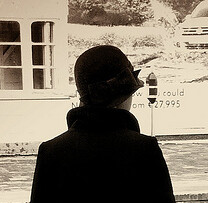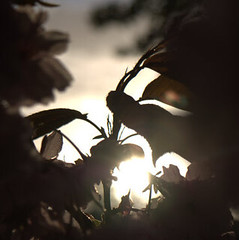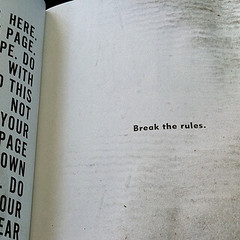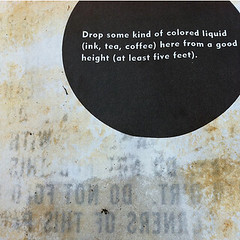The best in poetry (and poetic things), this week with Seth Haines.
1 Art
Have you ever been perusing Twitter and decided that you wanted to know the story behind the tweet? (The 140-character limitation is a bit of a story killer. Right?) If so, then check out this article about conceptual artists Nate Larson and Marni Shindelman, who “use GPS data to locate tweets and then add a photographic layer to the 140-character story.” When combined, their photographs, and the tweets which inspired them, create a multi-layered story.
Yes, social media and art seem to be intersecting more these days, and it’s no wonder. Where else does an artist have instant access to a global, seemingly infinite audience? Thankfully, online artists are taking advantage of the opportunities and creating serious works of art for our consideration. For example, take Brock Davis’ Instagram photo of a vintage muscle car jumping a piece of cake. Thought-provoking, right? Maybe not, but you must admit, Davis’ photographs are witty, fun, and certainly worthy of a “like” or two.
2 News
Tuesday marked the first annual Poetry at Work Day! (Cue the streamers and party horns.) Did you participate?
Poetry at Work Day was not so much about bringing poetry to work as it was about bringing “attention to the poetry that is already there in the workplace, and the poetry that is being created through work.” Glynn Young’s marvelous piece reminded us that poetry can be celebrated at work in various non-disruptive ways, and to help Glynn demonstrate his point, Tweetspeak compiled this infographic showing the various ways you could celebrate Poetry at Work Day.
And not to brag (shamelessly, I might add), but did you see that the Huffington Post got wind of our efforts and promoted Poetry at Work Day? Thanks for doing your part to promote what is sure to become a national holiday, Huff Post!
3 Publishing
We talk a lot here at the Top Ten about the changing face of publishing in light of e-publishing, and this week, we found this great report by the folks at New Tech City. Take a listen. It’s worth your time, especially if you’re an aspiring self-publisher.
4 Business
If you’re visiting Tweetspeak, chances are you are a creative writer of one stripe or another. And like the vast majority of creative writers, chances are, creative writing doesn’t pay the bills. (If it does, count yourself among the lucky few!) In your day job, do you find it difficult to conform to the rules of more technical writing, those tricky rules… like, the grammar ones. And here’s a better question—in your creative process, do you find stuffy and staid language, and the rules that so often accompany the same, seeping into your poetry or short stories? Indeed, this can produce quite awkward results.
There are those who argue, though, that there’s no reason to keep such strict lines of demarcation. In fact, some argue that intertwining creative writing in your business writings can create a more memorable product, something more persuasive, more readable. In addition, freeing yourself from the dichotomies of “business” versus “creative” writing can free you to write authentically. Enjoy this article on the topic by Erin Feldman, and then, draft a letter to your best client… in sonnet form!
5 Creativity
What drives people from mediocrity to achievement? What inspires grand creative works? What inspires the artist to paint, the poet to muse, or the famous explorers to set sail for unknown worlds? Perhaps it’s money, or fame, or power. “No, ” says Eleni Tagonidi Maniataki and Panos Mourdoukoutas in their article for Forbes, The Creative Power of Eros. And though you may think you understand the meaning of the Greek word “eros, ” read further. Their conclusions are not as prurient as one might surmise.
Are you working on a short story that you think is almost-nearly good? Perhaps you’re writing a novel that just lacks a little something. Looking for a way to spice it up? “Have a body hit the floor, ” says noted author Steven Pressfield. Pressfield states that good stories, truly creative stories, are those where stakes (not “steaks”) are involved. What does he mean? This post by Pressfield is insightful, directive, and references the Sopranos, so you know it’s worth a read.
6 Write-It
I’m an attorney by trade, and was reminded this week of the famous quote by Justice Louis Brandeis, “There is no great writing, only great rewriting.” Isn’t that the truth! I’ve been trudging through a manuscript of sorts, and have found the rewriting process to be terribly tedious, and maddeningly meticulous. But I’ve also found that it’s spawned more creative sentences, better paragraphs, more complete sections. Are you a careful rewriter? If not, consider these quotes by twenty great authors on the process of revision. Then, get to re-writing!
7 Poems
Continuing with the Every Day Poems theme (and the Glynn Young theme, too), Every Day Poems featured Glynn’s work, “Boss.” In it, he writes:
Stares at the corner where
two glass walls meet, almost
the exact point where the sun
sets, caught in the rise
of his people asking, probing
how and more and the descent
of his own boss seeking cuts. (Read the rest of “Boss”)
Can you feel the tension in his post? I loved this piece from the minute it arrived in my inbox.
And speaking of poems in my inbox, have you subscribed to Every Day Poems, the service that delivers daily poetry directly to your email inbox? It’s only $5.99 for a full year subscription. What are you waiting for?
8 People
“How society perceives matters of art in general depends on how far its soul has accepted the belief that art, poetry in this case, will not impose cutbacks on the escape it provides….” These are grand words from a 2011 speech by Greek poetess Kiki Dimoula. If you keep up with world news, you know that Greece is in the midst of national turmoil, that the words “austerity, ” and “cutbacks, ” are the phrases du jour. Has this turmoil hindered the Greek art and poetry? In this poignant piece at the New York Times, Dimoula touches on these issues, and discusses the work of a poet in difficult times.
And speaking of those who examine society through poetry, this week, Brain Picker shared this marvelous interview with poet, essayist, and activist Adrienne Rich. In it, she speaks to her interactions with society, how they give birth to poetic works.
9 Books
Do you enjoy reading fresh, new poetry? Are you a sucker for the tactile experience of a good, hot-off-the-presses book? Then check out National Public Radio’s suggestion of can’t-miss poetry for 2013. NPR synopses are sure to make you want each of the eight books reviewed. And in reading each of the NPR synopses, I thought it might be fun to CHALLENGE you to create a found poem from words or phrases used in the article. Who wants to give it a try? Leave your found poem in the comments below.
10 Sound n Motion
Richard Blanco has been chosen to deliver a poem for the inauguration of President Barak Obama. But did you know that the first president to include a poet in his inauguration was President Kennedy? In this great interview with Kwame Dawes, The Takeaway explores the history of inaugural poetry and provides a bit of a group-source poetry prompt.
Certainly Merle Haggard was never in jeopardy of being invited to speak at an inauguration, not the man who penned “Okie from Muskogee, ” but did you know that he received a Kennedy Center Honor from President Obama in 2010? This great video by the Tennesseean frames up the life of Haggard, the “poet of the common man.”
And finally, allow me to put Merle Haggard into a bit of musical context. Enjoy the poet of the common man.
Cover photo by NJ. Creative Commons license via Flickr. Article photos by Claire Burge. Used with permission. Post by Seth Haines.
__________________________
Buy a year of Every Day Poems, just $5.99 — Read a poem a day, become a better poet. In January we’re exploring the theme Coffee and Tea.
- Become a Better Writer: Fly Fishing Artist Date - June 6, 2014
- No Cat Poetry for Fierce Dog Lovers - November 22, 2013
- Exploring Poetry: Penning a Ghazal - October 18, 2013











Maureen Doallas says
Seth, you know I like a challenge, right? So here’s my found poem:
Reviewing the NPR Review
Don’t doubt the famous poets’
experience. This year marks
the emergence of fanatic guilt
and anguish in urban existence
in poems that radiate outward
in a circle from an empty middle.
Complicated this may well be
but a permanent celebration of high
and low culture in healthy doses
can make your own self-searching
look like a normal obsession, a lie
about everything you’re convincing
yourself is a searing if tortured story
of imaginary discourse on success.
Officially, it’s a good time to get excited
about poets’ uncanny ability to make
our technologically infused world
unbearably beautiful, to force us
to analyze the lonely life of reading,
the palpable hardship of writing
a myth-making celebration of struggles
with life-giving force.
You will need New York School forms
to think about your ambivalent role,
energy to collect the thrilling voices
scattered across the city like many
divine notes of reggae music, the weight
of an influential audience to dignify
your heartache and sadness, presses
of famous friends urging nothing
less than a chance for you to get lots
of domestic attention and a quick share
of digital love. If being monumental
like Neruda is illusive, as is often
the case, look in the better part
of your mind for the right subjects.
Consider the sources of small details,
the big questions that have beckoned
serious follow-up to fragmented feelings,
bring together the politics of flowers
and decades of the unrelenting unfolding
faith in extremely accessible guns.
The tenderest conversational poems can
be felt personally, stare at you like cues
for the vulnerable. Just check out the reviews
of almost everyone beloved who debuts.
Megan Willome says
Sometimes I think that I don’t actually like writing. But I love revising.
Ann Kroeker says
Love that first link to the photography layered with tweet and FB updates. Several were…haunting.
And I’m listening to the podcast about self-publishing.
Love how you pull things together, Seth. Good stuff.
Joy says
Here’s my attempt:
COLOSSAL
Now done with all that cliff wrangling
move on
stretching out
powerful, important and comfortably slim
facing death, love and maturity
the strange seem familiar and the familiar strange
will set them on fire
His unwaveringly intense inward gaze
as though his life depends on them
Lie to yourself about this
almost unbearably beautiful.
his reputation sealed
the voices of those suffering
unrelenting intensity and compassion,
so moving and immediate.
the complicated glory of
inheritors and interlopers
the kinds of things children like to imagine
a delightful assortment of small details
where does the soul reside?
his voice in these
long and short
Your history is scattered across the city.
laced with a lightly worn sadness
love and domesticity
a patient seamstress ponders the imagination as a fleeting, life-giving force.
sarah says
wonderful resources and inspiration. thank you.
Paul Willingham says
I couldn’t agree more. Haggard is the “poet of the common man”. As a fan since the 50’s of Country Music and artists like Cash, Tom T Hall, Robbins, Williams, Nelson and others, Merle Haggard sits at the top of the wordsmiths writing and performing Country Music. Thanks for the reminder and the memories.
www.adancion.com says
Admiring the commitment you put into your
website and in depth information you provide.
It’s awesome to come across a blog every once in a while that isn’t the same out of date rehashed material.
Excellent read! I’ve bookmarked your site and I’m including your RSS feeds to my Google account.